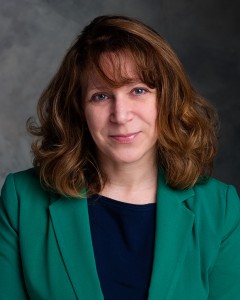AHA members are involved in all fields of history, with wide-ranging specializations, interests, and areas of employment. To recognize our talented and eclectic membership, AHA Today features a regular AHA Member Spotlight series.
Laura Schlosberg is the director of academic and educational support programs, undergraduate advising, and research at Stanford University. She lives in the San Francisco area and has been a member since 1996.
 Alma mater/s: BA, Wellesley College, 1992; MA, Duke University, 1995; PhD, Duke University, 2000; Certificate in Philanthropy and Nonprofit Organizational Leadership, Northwestern University, 2014
Alma mater/s: BA, Wellesley College, 1992; MA, Duke University, 1995; PhD, Duke University, 2000; Certificate in Philanthropy and Nonprofit Organizational Leadership, Northwestern University, 2014
Fields of interest: Imperial Russia, modern Europe, women’s history, cultural history, memoirs and memory, myth, space
When did you first develop an interest in history?
I was raised in an area of New Jersey that shaped my curiosity about connections between people, space, and history. From living near many historic sites, I saw the past as part of the local landscape. History also infused our family gatherings and everyday events. My father tape-recorded his relatives’ stories when we visited them. Holiday meals were sites where the adults retold family stories about previous generations to the children and grandchildren. My parents encouraged me to follow current events, sometimes pulling me away from homework or play to watch breaking news on television. Beyond witnessing such events, they inspired us to consider the legacy of such events. Growing up in this environment attuned me to the intertwining of the present and the past, and how individuals connect their life stories to grander historical narratives.
What projects are you currently working on?
During the 1820s, Zinaida Volkonskaia began an intensive period of historical study and writing, penning a libretto of Joan of Arc, a social history of the early Slavs, and a revision of a founding myth of Russia focused on its first female ruler, Olga. Volkonskaia also gathered people’s memories of Emperor Alexander I soon after his death. I am curious about why a person known for her lively salon gatherings and playful writing took this turn, as well as the thread of women’s authority connecting these works.
The lists of salon guests I collected during my dissertation research seem like good sources for a social network analysis of 19th-century St. Petersburg literary salons and the Imperial Court to see whether this would demonstrate anything new about the dynamics between the two sites and the women who held authority there.
Have your interests evolved since graduation? If so, how?
Increasingly I have been asking questions about why people, events, objects, and less tangible things are remembered. This has led to an interest in memory and myth-making.
With a career in higher education administration, my reading list expanded to include student development theory, curricular and advising assessment, ethics, campus cultures, institutional histories, strategic plans, and histories of higher education and the liberal arts. Much of what I learned studying history in graduate school transfers to my work in administration. While I no longer engage in historical analysis every day, I draw on those skills for projects such as policy research, reports to foundations, and archiving projects.
Is there an article, book, movie, blog etc. that you could recommend to fellow AHA members?
I have been following the development of Shannon Galpin’s documentary Afghan Cycles (http://www.afghancycles.com), which will be released in Spring 2016. She is encouraging women in Afghanistan to ride bicycles, and started the Afghan women’s national cycling team. Galpin intentionally connects her documentary with the bicycle as a symbol of freedom and change for women in the past.
What do you value most about the history profession?
The passion that historians bring to their work!
Why have you continued to be a member of the AHA?
The developments in the field keep me connected to issues facing faculty, librarians, and publishers.
This post first appeared on AHA Today.
Tags: AHA Today Member Spotlight Europe Cultural History
Comment
Please read our commenting and letters policy before submitting.






